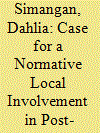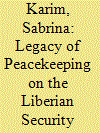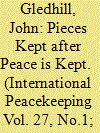| Srl | Item |
| 1 |
ID:
174097


|
|
|
|
|
| Summary/Abstract |
Liberal peacebuilding’s imperfect record of involving local actors in rebuilding post-conflict societies paved the way for the local turn in peacebuilding. One of the issues the local turn highlights is local involvement in peacebuilding processes. Drawing from the experiences of previous peacebuilding missions in Cambodia, Kosovo, and Timor-Leste, this paper contributes to the local turn by identifying the types of local involvement in peacebuilding and their consequences on post-conflict societies. This identification could be useful in steering the local turn away from the same flawed local involvement that brought liberal peacebuilding into crisis. The analysis in this paper demonstrates how exclusive, superficial, non-representative, and politicized types of local involvement failed to achieve or sustain peace in Cambodia, Kosovo, and Timor-Leste. The conflict-promoting tendencies of these types of local involvement make a case for a normative agenda that is inclusive, substantive, representative, and transformative.
|
|
|
|
|
|
|
|
|
|
|
|
|
|
|
|
| 2 |
ID:
174096


|
|
|
| 3 |
ID:
174092


|
|
|
|
|
| Summary/Abstract |
A growing body of research shows that peacekeeping missions are ‘gendered’, both in terms of composition and organizational cultures. However, studies have tended to focus on more immediate consequences of these characteristics. This short contribution on effects of trafficking for forced prostitution in Bosnia–Herzegovina suggests that gender norms can also significantly influence longer-term legacies of peace operations. It briefly highlights connections between large-scale peacekeeping and the emergence of Bosnia–Herzegovina as a sex-trafficking destination and discusses enduring implications of these trends for regional, local and human security. This case suggests that considering the role of gender norms and women’s specific experiences can help develop the wider research agenda outlined in this forum: the study of peacekeeping legacies.
|
|
|
|
|
|
|
|
|
|
|
|
|
|
|
|
| 4 |
ID:
174094


|
|
|
| 5 |
ID:
174090


|
|
|
| 6 |
ID:
174091


|
|
|
| 7 |
ID:
174088


|
|
|
| 8 |
ID:
174093


|
|
|
| 9 |
ID:
174099


|
|
|
|
|
| Summary/Abstract |
International intervention is widely considered to stabilize peace in post-war societies. Its effects on democracy are more contested. External intervention risks reinforcing, rather than resolving deadlocks in domestic politics. This negative effect is not inevitable. This article proposes a new, theoretical model of political peacebuilding, based on a spatial model of politics in post-war democracies. In the classical model, the peacebuilding mission has an own political agenda, which relieves the domestic political actors of their political responsibility and deepens the domestic deadlock. In the arbiter model proposed in this article, the peacebuilding mission uses its powers to push for compromises between the domestic actors. This enables democratic decision-making within the domestic institutions. Empirically, the paper studies the impact of the Office of the High Representative (OHR) in Bosnia–Herzegovina with its power to issue binding decrees. The paper analyses the role of former High Representatives, using the authors’ original interviews with the office-holders and over 2700 press releases. As the results show, periods when the OHR acted as an arbiter were rewarded with a higher degree of cooperation between domestic elites. These findings corroborate the usefulness of the arbiter model as a new strategy of international intervention in post-conflict societies.
|
|
|
|
|
|
|
|
|
|
|
|
|
|
|
|
| 10 |
ID:
174098


|
|
|
|
|
| Summary/Abstract |
The United Nations’ Department of Peacekeeping Operations increasingly employs private military and security companies (PMSCs) to provide a range of services in peacekeeping operations (PKOs). The UN's reliance on PMSCs is often justified by quantity and quality gaps in traditional peacekeeping forces that must be filled by private companies’ expertise and efficiency. We argue that these long-standing gaps cannot adequately explain the use of PMSCs, which do not bring unique services and potentially undermine UN legitimacy. Instead, the UN's organizational rigidity, financial flexibility, and procurement opaqueness encourage PMSC use without accurately assessing their need, costs, and benefits. We suggest organizational reforms, without which PMSC involvement in peacekeeping operations is likely to continue and expand, and we propose further research to explain the PMSC phenomenon.
|
|
|
|
|
|
|
|
|
|
|
|
|
|
|
|
| 11 |
ID:
174095


|
|
|
| 12 |
ID:
174100


|
|
|
|
|
| Summary/Abstract |
Recent trends in international responses to civil war and humanitarian crises highlight the growing importance of multilateral intervention by intergovernmental organizations (IGOs). Academics and practitioners agree that higher levels of cooperation should yield better outcomes, while the literature emphasizes the importance of commitment. Yet the question of how organizations collaborate with each other and local authorities remains largely uncharted, despite its growing importance for the future of international peacemaking and peacebuilding. This paper analyzes DDR processes within the context of organizational networks and programme ‘ownership.’ It extends existing literature by adding nuanced understandings of ownership and assessment of the interactive processes through which the programme is offered as factors in understanding outcomes. The paper focuses on two factors – ownership and collaboration (both type and scope) –to analyze how IGOs interact and in particular comprise or respond to the local/international nexus of DDR peacemaking and peacebuilding. Its findings suggest that no single factor is sufficient for understanding DDR outcomes. Contrary to standard beliefs, the locus of ownership of may not be as critical as other factors, and context may be more important to outcomes than incentives. These findings define areas for further research related to specific combinations of factors and the causal dynamics and challenges of collaboration among participants.
|
|
|
|
|
|
|
|
|
|
|
|
|
|
|
|
| 13 |
ID:
174089


|
|
|